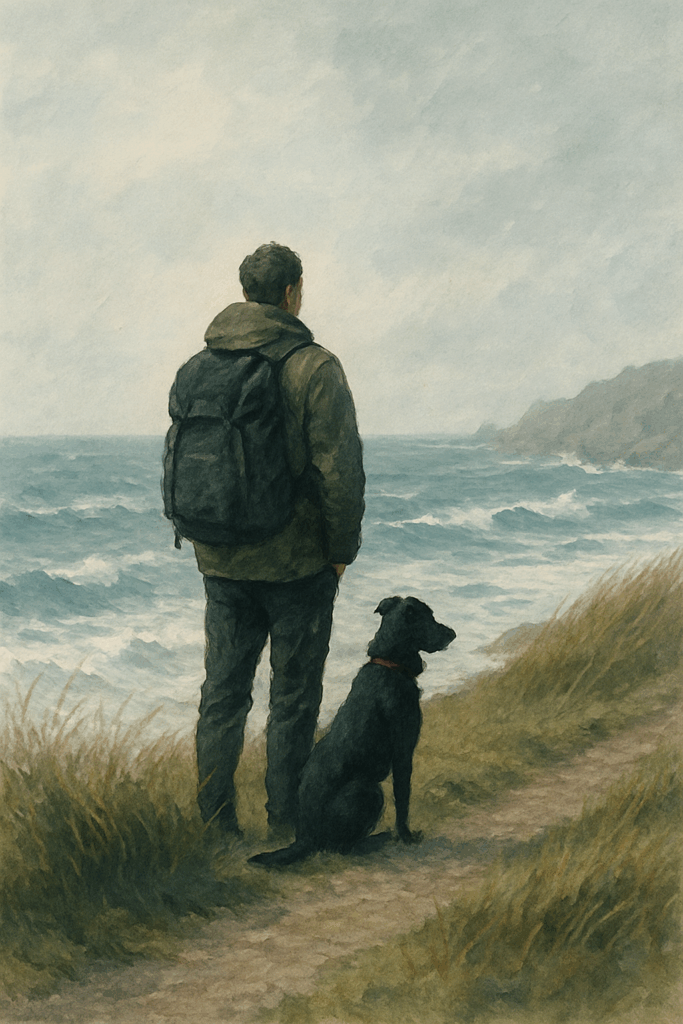A Memoir of Walking, Wilderness, and the Slow Journey Home to Self

Finding Hildasay by Christian Lewis is a deeply honest and quietly powerful memoir chronicling one man’s extraordinary walk around the entire coastline of Britain. But while the outer journey is remarkable, what truly lingers is the inner one – a long, often painful, sometimes luminous pilgrimage through depression, solitude, and eventual healing.
At the outset, Lewis is at a breaking point. Struggling with mental illness and feeling profoundly disconnected from life, he makes the impulsive decision to set out on foot with minimal supplies, little money, and no grand expectations. His plan is stark in its simplicity: keep walking. Keep moving forward. That first step, taken on a whim from his home in Wales, becomes the beginning of something far greater than he could have imagined.
Walking Toward Renewal
As he traverses the coastlines, Lewis encounters the full spectrum of human and elemental experience: brutal weather, physical injury, disheartening setbacks – but also moments of deep peace, unexpected generosity from strangers, and the forging of a new relationship with himself. His writing is unpretentious and direct, allowing the emotional weight of his experiences to emerge naturally. Particularly moving is the bond he forms with Jet, a rescue dog who joins him mid-journey and becomes a steadfast companion, grounding him in moments of despair and joy alike.
A pivotal chapter in Lewis’s story unfolds on the uninhabited island of Hildasay during the COVID-19 lockdown. Stranded there for three months, he finds himself in forced solitude – with no distractions, no escape, and no option but to confront himself. Yet what could have been a descent into isolation becomes a kind of crucible, a time of cocooning in nature that facilitates deep inner renewal. The island, stripped of all human comfort, becomes a teacher, a mirror, and ultimately, a sanctuary.
Nature as a Fierce Companion
Lewis doesn’t romanticize nature. The landscapes are breathtaking, yes, but also merciless. He acknowledges the wildness and indifference of the elements – the way wind and rain can humble a person, how a storm can make you feel both tiny and vividly alive. Nature here is not a postcard backdrop but an active presence in his transformation. It is both companion and challenger, dismantling the ego and stripping things back to essentials.
This relationship with the natural world is part of what gives the book its grounding. Lewis is not conquering terrain; he is listening to it. He is learning to read tides and weather patterns, to respect his limits, and to surrender to something greater. The journey becomes a dialogue between human vulnerability and the earth’s raw wisdom. In this sense, Finding Hildasay is also a book about slowness, attentiveness, and the art of moving through life with presence.
A Soul’s Unfolding Journey
The power of Finding Hildasay lies in its lack of performance. Lewis does not try to be inspirational. He simply tells the truth. His honesty about the darkness he has faced – along with his quiet wonder at what he discovers on the other side – is what makes this memoir so compelling. There’s no neat resolution, no polished life lesson. Just a sense that healing is possible, that it unfolds in its own time, and that it often looks far more ordinary than we expect.
Readers who have experienced loss, depression, or periods of profound questioning will find much to relate to here. Lewis’s transformation is not built on epiphanies, but on endurance, small choices, and the cumulative wisdom of the road. It’s about what happens when you keep showing up, even when you don’t know why.
Enduring Hope
Ultimately, Finding Hildasay is a story of resilience – not in the triumphant, sanitized sense, but in the slow, honest, deeply human way. It reminds us that sometimes the most meaningful journeys are not about distance or destination but about allowing ourselves to be reshaped by the road. By trusting that even in the wildest places – both within and without- something true and healing might be waiting for us.
If you resonate with the themes in this book – the call to step away from the familiar, the healing found in wild places, and the slow discovery of inner truth – you might enjoy exploring The Wanderer archetype. This archetype represents those who seek meaning through solitude, movement, and soul-aligned detachment from convention.
